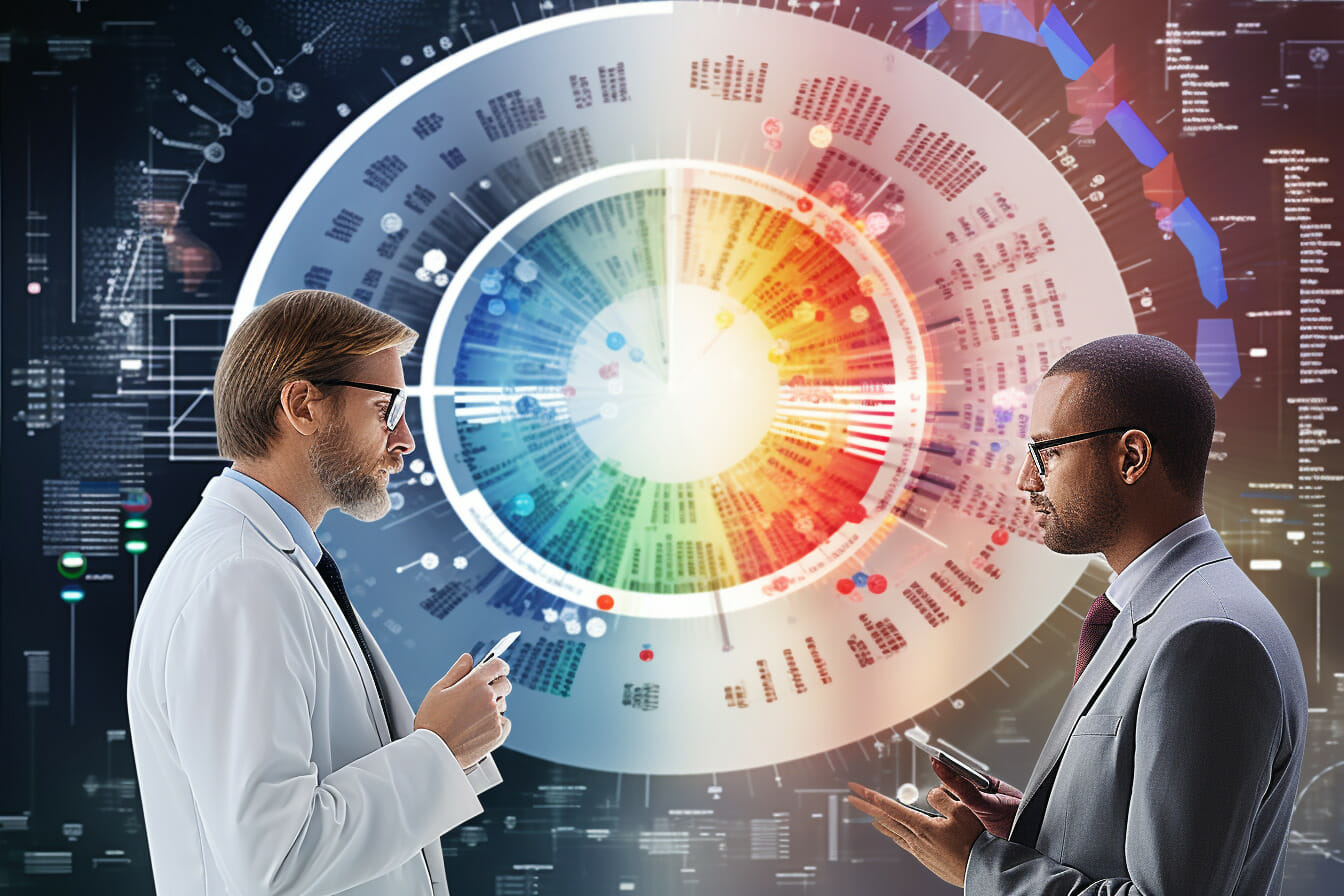Differentiating Data Analyst and Data Scientist Roles
Do you need help to become a data analyst or a data scientist? These two careers may seem similar, but they’re pretty different.
This article will explore their roles, responsibilities, and required skills. We’ll also highlight how they uniquely contribute to an organization.
By the end, you’ll better understand which career path suits you best. Let’s dive in!
Table of Contents
Understanding the Role of an Information Analyst

An information analyst’s role isn’t just about crunching numbers; it’s about interpreting data, identifying trends, and providing actionable insights to guide decision-making processes.
As an information analyst, you’d collect data, perform statistical analyses, and translate complex results into understandable reports. You’d essentially act as a bridge, connecting an organization’s technical and business aspects.
Being a successful information analyst requires a mix of technical know-how, problem-solving skills, and business acumen. You’d need to understand databases, programming, and statistical software. At the same time, you should be able to communicate your findings effectively to non-technical colleagues.
It’s only a role for some, but if you’re a detail-oriented person with a knack for discovering patterns and insights in data, it could be a perfect fit for you.
Delving into the Work of a Scientific Information Researcher
As a scientific information researcher, you’d immerse yourself in the exciting information gathering and interpretation world. You’d apply your statistics, machine learning, and data visualization knowledge to analyze and interpret complex data sets. In this role, you’d also identify trends, create models, and predict future patterns.
However, unlike a data analyst who primarily focuses on interpreting data to help make business decisions, you’d dive more deeply as a scientific information researcher or data scientist. You’d design and implement algorithms and predictive models to understand the data better. Your work could lead to major technological innovations, scientific breakthroughs, and strategic insights.
It’s a challenging and rewarding career where your analytical skills and passion for data can make a difference.
Comparing Responsibilities and Tasks

You’re probably wondering how the roles and duties of a scientific information researcher differ from those of other professionals in related fields, right? Well, let’s compare the parts of a data analyst and a data scientist.
As a data analyst, you’re responsible for inspecting, cleaning, transforming, and modeling data. You aim to discover helpful information, suggest conclusions, and support decision-making.
On the other hand, a data scientist performs data analysis and uses machine learning algorithms and statistical models to predict future outcomes. They’re expected to devise innovative solutions and strategies based on the data’s patterns.
So, while there’s overlap, a data scientist’s role is more comprehensive, demanding a deeper understanding of data and its potential applications.
Required Skills for Each Profession
Different skill sets are necessary for each profession, with specific knowledge and abilities required to excel in each role.
As a data analyst, you’ll need to master skills like data cleaning, exploratory data analysis, and statistical analysis. You should be proficient in SQL, and possibly other programming languages like Python or R. Data visualization tools such as Tableau are also important.
On the other hand, as a data scientist, you’ll need an advanced understanding of machine learning algorithms and predictive modeling. Proficiency in programming languages and statistical and mathematical skills are necessary. You’d also need to be adept at using big data platforms and tools like Hadoop, Spark, or Hive. Understanding business strategies and being able to communicate complex data insights effectively is critical as well.
The Unique Contributions to an Organization

Consider the unique contributions you can make to an organization, depending on whether you specialize in data analysis or data science.
As a data analyst, you’re the investigator, diving deep into data to extract valuable insights and trends. You help businesses understand their performance and make data-driven decisions. You’re the one who translates complex data into a language everyone in the company can understand.
However, if you’re a data scientist, your work is more about predicting and strategizing. You build models to forecast future trends and help the company prepare for what’s next. Your job is crucial in identifying opportunities for growth and efficiency.
Both roles are essential, but the choice depends on where you see your strengths and how you want to contribute to the organization.
Frequently Asked Questions
What is the difference between a data analyst and a data scientist?
While both roles involve working with data, there are some critical differences between a data analyst and a data scientist. A data analyst primarily analyzes and interprets data to help businesses make informed decisions. On the other hand, a data scientist goes beyond analysis and involves tasks like data manipulation, machine learning, and developing predictive models.
What does a data scientist do?
A data scientist’s role encompasses a broader range of responsibilities. They work with large and complex datasets to extract insights and develop models to predict future outcomes. They also use advanced techniques like machine learning and artificial intelligence to analyze data and provide actionable recommendations to businesses.
What steps can I take to become a data scientist?
To become a data scientist, you can start by obtaining a bachelor’s degree in a field such as computer science, statistics, or mathematics. It is also beneficial to gain practical experience through internships or projects. Additionally, acquiring knowledge in machine learning, data mining, and programming languages like Python or R can help pursue a career in data science.
How do data analysts and data scientists use data?
Both data analysts and scientists work with data to uncover insights and make informed decisions. Data analysts typically analyze and interpret data to identify trends and patterns. On the other hand, data scientists use data to develop predictive models, create algorithms, and apply advanced techniques to solve complex problems.
What is the difference between data analytics and data science?
Data analytics involves analyzing and interpreting data to uncover insights and inform decision-making. It focuses on extracting meaning from structured and unstructured data. On the other hand, data science encompasses a broader range of activities, including data analysis, machine learning, predictive modeling, and building algorithms to solve complex problems.
Can a data analyst become a data scientist?
A data analyst can transition into a data scientist role by acquiring additional skills and knowledge. This may involve gaining expertise in machine learning, artificial intelligence, and advanced data techniques. Taking relevant courses or pursuing a higher degree in data science can also help transition.
What is the career path for a data analyst or a data scientist?
Both data analysts and data scientists can have promising career paths. As a data analyst, you can progress to senior data analyst, data scientist, or data analytics manager positions. Similarly, as a data scientist, you can advance to roles such as senior data scientist, machine learning engineer, or data science manager.
How do data scientists and data analysts differ in terms of skill sets?
Data scientists typically require more technical skills compared to data analysts. While both roles involve data analysis, data scientists also need machine learning, artificial intelligence, programming, and statistics expertise. On the other hand, data analysts focus more on data visualization, statistical analysis, and communication skills to present insights to stakeholders.
Can a data analyst become a data scientist or vice versa?
While the roles of a data analyst and a data scientist have some overlap in terms of skills and knowledge, they are distinct roles with different focus areas. However, a data analyst can transition into a data scientist role by acquiring additional machine learning, data modeling, advanced analytics skills and expertise. Similarly, a data scientist can transition into a data analyst role if they want to focus more on data analysis and reporting rather than predictive modeling and advanced analytics.
What is the difference between data science and data analytics?
Data science and data analytics are related disciplines but have distinct focuses. Data science involves using scientific methods, algorithms, and statistical techniques to extract insights and knowledge from data and to develop predictive models and algorithms. On the other hand, data analytics focuses on analyzing data to discover patterns, trends, and insights that can be used to make data-driven decisions and improve business performance.
Conclusion
You’ve seen how data analysts and data scientists play vital organizational roles. They differ in responsibilities, required skills, and their unique contributions.
While an analyst interprets data, a scientist uses it to predict and strategize. Both are crucial, and understanding both roles can help you decide which path might best fit you.
Whichever route you choose, you’re sure to make a significant impact.













